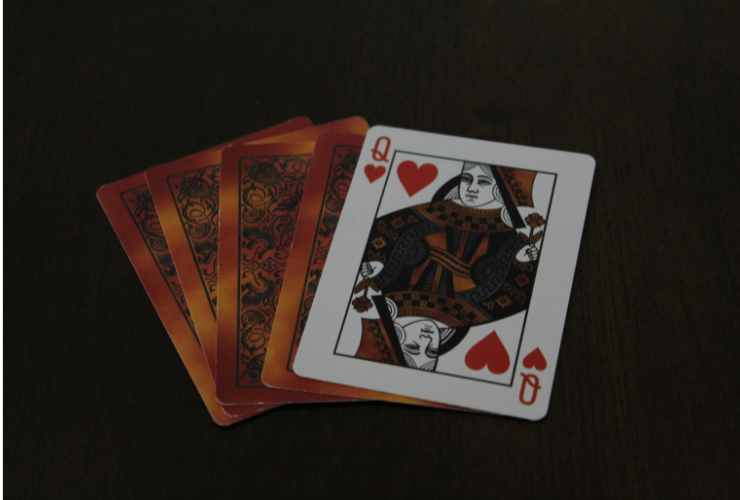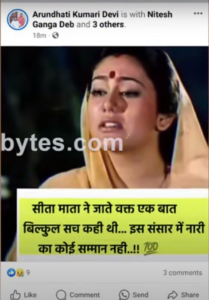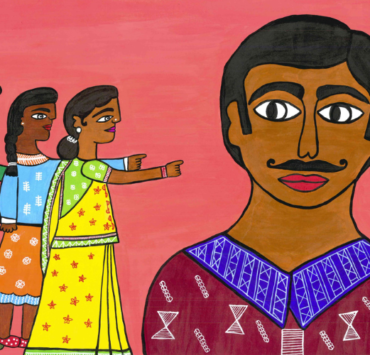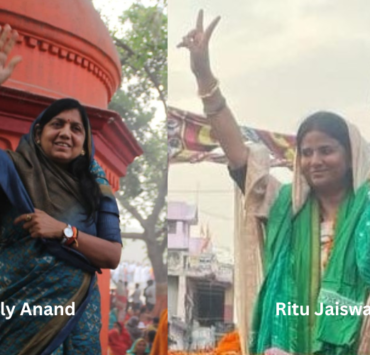
By Rakhi Ghosh

The Biju Janata Dal (BJD), the leading regional party in Odisha, has been continuing with its 2019 promise of reserving 33 percent seats for women candidates for Lok Sabha elections. It is also one of the first states in the country to implement 50 percent reservation for women in panchayat elections. However, its recent move to replace two prominent women candidates has drawn flak.
Arundhati Devi, who had been given a ticket to contest from the Deogarh Assembly seat was dropped recently. Devi is the wife of former Sambalpur BJP MP (and traditional ‘king’ of Deogarh) Nitesh Ganga Deb. When BJP replaced Ganga Deb and nominated Dharmendra Pradhan to contest from Sambalpur Lok Sabha constituency his wife and son joined the BJD. She has since been replaced by Romanch Ranjan Biswal, the party’s candidate in 2019 who lost to the Bharatiya Janata Party (BJP).
Srimayee Mishra is a prominent political figure and BJD’s general secretary. She had started campaigning for Bhubaneswar Lok Sabha seat after getting feelers from the party about her candidature when she was replaced. She was preparing to take on BJP stalwart and sitting MP Aparajita Sarangi when the BJD announced new entrant Manmath Routray’s name for the prestigious seat.
A dejected Arundhati Devi posted on Facebook a crying photo of ‘Sita’ from the TV serial Ramayana. The post said, ‘When Mother Sita left this world, she said there is no respect for women in this world.’ Apart from this both candidates have been mum about the ‘jolt’.

Political analysts point out the BJD’s decision was particularly unfair as it had strongly favoured granting a third of its seats for women.
Almost all parties in Orissa have enthusiastically nominated women candidates for Assembly and Lok Sabha seats and have announced the names. The Biju Janata Dal had taken a lead by nominating seven women for the Lok Sabha and 35 women candidates for the Assembly elections. The BJP has fielded four women for the Lok Sabha and 20 for Assembly while the Congress has fielded three women candidates and 21 candidates for Assembly elections. The coastal state has 3.35 crore voters out of which 1.65 crore are women.
Senior journalist and political analyst Dr Rajaram Satpathy said, “Political parties nominate wives, widows and daughters of political families to secure the seat as well as to woo women voters. This has nothing to do with women empowerment. If parties want to emphasise reservation of one third of the seats, they should nominate women candidates who associate themselves with issues at ground level and can push forth those issue in the assembly or Parliament.” He continued, “by nominating family members they want to retain control in their hands.” He also said, “Besides family members, political parties nominate women candidates who rarely participate in parliamentary proceedings. In the last election (2019) BJD had nominated a candidate from an SHG (self-help group)in Ganjam constituency to Lok Sabha but if you see the proceedings she has hardly participated. There are many such elected members in Assembly too who are from political family backgrounds who have never participated in any discussions or proceedings because they don’t have connections with the issues of local people. Parties purposefully look for timid women candidates who wouldn’t raise voice without their permission.”
In Odisha, women joining politics is not new. In the pre-independence Assembly period from 1936-1947, Sarala Devi, Purna Prava Devi and A Laxmi Bai were elected from Cuttack and Berhampur constituencies. Later, a Laxmi Bai was the Deputy Speaker of Orissa Legislative Assembly from 1946 to 1952. Dr Dasarathi Bhuyan, in his paper, ‘Women Politics in Odisha: Trends and Challenges’, writes about the increasing trend of women joining politics after independence, women were elected and appointed as ministers but the real power continued to lay with male politicians. Politics in Odisha was always male-dominated. Though Basant Manjari Devi was the deputy minister in Harekrushna Mahatab cabinet from 1946-1959, she was said to be a ‘decorative piece’ as the decision-making was done by male politicians. In last 88 years, since the formation of Odisha, the state has seen one-woman chief minister – the dynamic Nandini Satpathy (1974-76).
Caste wise, kshyatriya women have always dominated the political space, but in the past few years, women from Scheduled Caste and Scheduled Tribes have made inroads in politics. When the President of India Droupadi Murmu became the first person from Odisha to occupy the highest post in the country, she boosted the aspirations of the women politicians. Last year, six-time MLA Pramila Mallick became the first woman speaker of Odisha Legislative Assembly. Politicians Saraswati Hembrum, Frida Topno, Sushila Tiriya, Hema Gamang, Rajashree Mallick too have made a mark in state politics.
Although women have proved themselves in politics, parties still hesitate to give them leadership positions and roles owning to the still prevailing patriarchal mindset. A political science lecturer and a columnist, requesting anonymity, says, “Political parties want to play safe. While selecting women candidates they see the winnable factor in them. They find wives, widows, mothers and daughters more suitable candidates than an independent woman who herself tries to climb the ladder. It’s a usual practice for a party to field the wife or daughter after the death of a partyman to get sympathy votes.”
Gender expert Rukmini Panda argues that this needs to change and parties need to nominate women representatives from intersectional identities. “Parties nominate family members instead of outsiders to have control over political decisions. After a woman gets elected, it’s the male members who enjoy power. This needs to change. In a state where the population of tribals and Dalits are around 40 percent, more women from these communities need to be represented so that their voices are heard in the political space.”
Take Sofia Firdous, a first-time candidate, who feels that voters have become more accepting of women candidates. Firdous, an entrepreneur and significantly, the daughter of Cuttack Barabati MLA Mohammed Moquim, is the Congress candidate from the same constituency. She has replaced her father, who cannot fight the elections as a legal case is pending against him. In her last 12 days of hectic campaigning, she says she has been overwhelmed by the support shown by people. “If a candidate is capable and the voters are convinced by the choice, gender does not matter. Now, voters also want more women in decision-making roles,” she says.
Political analyst and senior journalist Bhakta Tripathy argues that the current situation has nothing to do with gender equality. “By giving ticket to women candidates, political parties are playing the woman card. Later, if they feel a male candidate has more of a winnable factor, they immediately replace the woman candidate as seen in both Arundhati Devi and Srimayee Mishra’s case,” adds Tripathy.
Only women who have influence through their family have more chance of getting nominated, says a woman candidate requesting anonymity. “This election, we have seen many candidates hopping from one party to another if they are denied tickets. But the number is less among women as political parties prefer men over women candidates,” she says. She adds, “They think women are less efficient, less mobile, and cannot go for intensive and aggressive campaigns. Only if another party fields a woman do they do the same.”
The patriarchal mindset seems to be still at play, as parties sideline women, irrespective of their ability and winnability factor.
Rakhi Ghosh is an independent journalist with nearly 20 years of experience working in Odisha. She writes stories on health, migration, education, climate change and gender impacting marginal communities. She has received few media fellowships and awards.
Edited by Nisha Susan




